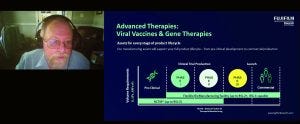- Sponsored Content
Development of an Advanced Gene Therapy Platform
August 28, 2020
Sponsored by Fujifilm Diosynth Biotechnology
 Steve Pincus, PhD, head of science and innovation, Fujifilm Diosynth Biotechnologies
Steve Pincus, PhD, head of science and innovation, Fujifilm Diosynth Biotechnologies
Fujifilm Diosynth Biotechnologies (FDB) is a contract development manufacturing organization (CDMO) with four sites in the United Kingdom, Denmark, and the United States (Research Triangle Park, NC, and College Station, TX). The sites in Denmark, the United Kingdom, and North Carolina specialize in proteins and monoclonal antibodies (MAbs) with capabilities up to 20,000 L. The Texas site works primarily on virus-based therapies and was founded by Texas A&M University as Kalon Biotherapeutics in 2011. FDB acquired Kalon in 2014. One of its two facilities is the National Center for Therapeutic Manufacturing (NCTM), which uses mobile clean rooms in one-, two-, and three-unit configurations separated by well-controlled walkways. The second site is devoted to biomanufacturing. It produces MAbs using the company’s Saturn MAb platform process, with several different 2,000-L trains. The viral biomanufacturing area currently contains five mobile clean rooms, with room for 10. FDB plans to expand both facilities to launch a gene therapy expansion initiative. The NCTM, currently configured for work from preclinical to phase 2 stages, will be extended into small-scale commercial production up to 500 L.
Pincus focused on work at the Texas site’s gene therapy platform for advanced viral therapies, which encompass three different types of projects: in vivo gene therapies, predominantly using adenoassociated virus (AAV) vectors; oncolytic viruses, predominantly adenoviruses; and next-generation vaccines, for which viruses are attenuated specifically by deletion of certain genes and complemented on cell lines that produce them. That creates an attenuated virus propagated only on a cell line that supplies the missing function in a recipient. FDB uses three systems for AAV production in adherent and suspension modes: a baculovirus system, a herpes simplex virus (HSV) system, and a three-plasmid transfection system.
Pincus described the company’s experience with those platforms, focusing on a new partnership with Oxgene. FDB licensed Oxgene’s HEK293 suspension cell line and its plasmid system for clients that don’t have their own materials for making AAV constructs. The presentation highlighted new offerings based on that strategic partnership. FDB will offer AAV serotypes 2, 5, 6, and later on, 8 and 9, along with the antivirus helper plasmid and a gene-of-interest plasmid backbone. Adenovirus helper and Rep-Cap plasmids will be available off the shelf as good manufacturing practice (GMP) material along with gene-of- interest backbone plasmids.
An analytics panel is created for full characterization of AAV material as that is generated. Pincus showed studies on assuring compatible yields between Oxgene and commercial plasmids, then described a first-generation platform for developing a 500-L suspension cell platform in different sizes of single-use bioreactors.
Tools for manufacturing at 500-L scale help FDB determine the optimal situation for cell transfections and scale-up with single-use bioreactors. FDB’s first-generation downstream process will be similar to what the company already has performed for a number of projects. A licensed step will be used for antibody serotypes along with Benzonase nuclease treatment to remove host-cell DNA and unincorporated genomes.
For the affinity-resin capture step, FDB will compare broadly specific affinity resins with those tailored for a specific AAV serotype to develop the best platform approach. Ion-exchange chromatography polishing ensures the best removal of empty capsids from the process stream, and postcapture chromatography steps concentrate material and change buffer to a final buffer. Other steps include sterile filtration, transduction assays, analysis of total AAV particles, and replicon assays to meet regulatory requirements for showing fewer than 200 base pairs of host-cell DNA. The quality control (QC) department will look at bioburden, pH, and osmolality.
For the transduction assay, FDB is working with sister company Cellular Dynamics to evaluate cell lines derived from stem-cell clones and identify those most active in determining infectious particles from AAV serotypes. FDB has a number of plans for future improvements to its platform and upstream processes, including optimizing transfection conditions and improving media to get higher cell growth and better transfection efficiencies. FDB and sister company Irvine Scientific will look at ways to increase cell densities, improve binding and elution profiles, and achieve the best separation possible using ion-exchange chromatography. FDB is developing a second-generation host-cell protein assay with its colleagues in North Carolina using mass spectrometry.
Watch the complete presentation now.
You May Also Like





